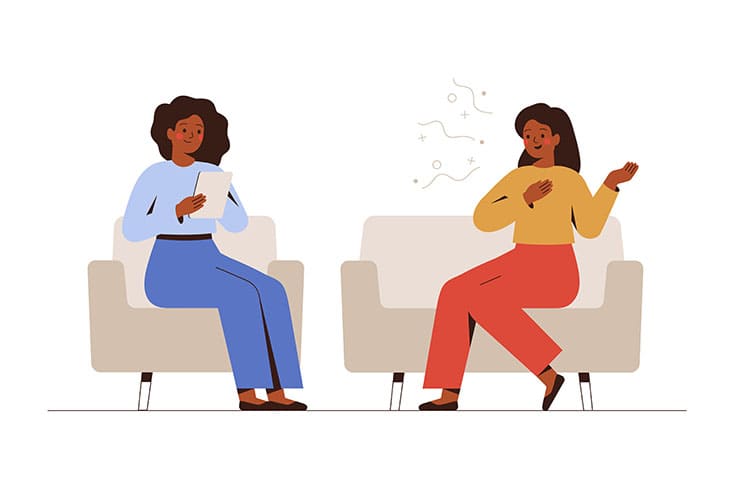July 19, 2021
By Emily Douglas

What am I? Who are you? Which box do I check? Which version of myself do I need to be today? And why do I have to be just one?
This past May, licensed professional counselor, Ashley Ann Daniel, addressed these questions in her dissertation titled “The Lived Experience of Professional Counselors Who Are First Generation South Asian American.”
Her work, which highlights the intersection of the personal, professional and racial identities of South Asian American professional counselors, underscores one undeniable point: Navigating identity as a professional counselor becomes wildly complex when paired with intersecting racial, ethnic, religious, gender and other identities.
It’s a complexity that’s beautiful. And, as illustrated in a growing body of work and writing by mixed-race counselors and other mental health care professionals of color, is rich in self-reflection, compassion and professional maturity.
There are an infinite number of reasons to celebrate these complex identities and how they’re shaping the future of the counseling profession.
Deep Thoughtfulness and Intentionality in Counseling Practice
Every person brings a unique set of experiences and identities to the counseling relationship. This is particularly true of multicultural and multiracial clients, which is why counselors who share that kind of complex lived experience bring a tremendous amount of thoughtfulness and intention to their work.
Tyce Nadrich, a licensed mental health counselor, faculty member and counselor educator at Molloy College, regularly emphasizes the considerations he makes when working with clients with complex identities. In a 2019 interview for Counseling Today, he noted the following in relation to his work with an adolescent client who self-identified as Black, cisgender and queer:
- “To the client, my identities as Black and cisgender may place me as an insider or safe to speak with, but my identity as heterosexual may place me as an outsider or an oppressor. I had to consider the spectrum of my humanity, the intersections of my various identities, the meaning that can be derived from who I am and what I may represent to my client, and intentionally make space for it all within the counseling relationship.”
This thoughtfulness and intentionality are important aspects of multicultural competence in any therapeutic setting.
A More Expansive Vocabulary
“You are not half anything. You are whole.” Licensed professional counselor associate Angeline Miller describes her professional practice as “warm, authentic, culturally-affirming therapy” which has been shaped by her own exploration and embracement of her mixed-race identity. She writes:
- “For most of my life, I’ve described myself as ‘half Filipino and half White.’ Never mind that I’m not a piece of pie. Never mind that splitting one’s self off like this doesn’t acknowledge the unique ‘new’ thing created by the intersection of multiple identities.”
Miller’s self-identification as mixed-race affords her a vocabulary and language that focus on the wholeness of our individual identities, which better guides connection, healing and growth with her clients.
A Commitment to Improving Opportunities
Bilingual and multilingual counseling students often find themselves facing a huge gap in their professional education and training when it comes to translating concepts and experiences in the mental health space. But that gap is leading to the development of programs designed to meet the needs of counselors-in-training who have more complex identities as well as those of their future clients.
Olga Mejía, an associate professor of counseling at California State University in Fullerton (CSUF), explains that although Spanish is her first language, there is a difference between Spanish and therapeutic Spanish. But because her own professional education in counseling didn’t account for cultural context and nuance between languages, she felt lost during her first clinical position.
To help close that gap for counseling students at CSUF, Mejía started Ánimo, a Latinx counseling emphasis within the school’s department of counseling. The new component is designed to address the professional, curricular and training needs of mental health counselors working with Latinx and Spanish-speaking clients and focuses on developing self-awareness as a bilingual and bicultural counselor.
Accepting the Many Facets of Identity
Rohan, a licensed marriage and family therapist highlighted in Daniel’s dissertation who identified himself as a 41-year-old Christian, homosexual, South Asian male from India, reflected on his desire to embody all of his personal identities in his work as a counselor. He explained:
- “I started thinking about it 10 years ago. I had all of these competing factors, my colleagues, and even personal friends who were like, you need to be an ‘out’ therapist or a South Asian therapist or a Christian therapist. And I’m like, why can’t I do it all?”
Counselors are essential mental health care professionals who help us improve our mental health and enrich our lives. These conversations around the complex lived experiences and identities of both counselors and the clients they serve are shaping the profession as a whole and, in turn, the depth and beauty of the counseling experience.
Emily Douglas is a content writer at the American Counseling Association, the largest association exclusively dedicated to the growth and advancement of the counseling profession across all practice settings. Her writing focuses on the intersection of language, identity and well-being.
Submit To The NAMI Blog
We’re always accepting submissions to the NAMI Blog! We feature the latest research, stories of recovery, ways to end stigma and strategies for living well with mental illness. Most importantly: We feature your voices.
LEARN MORE